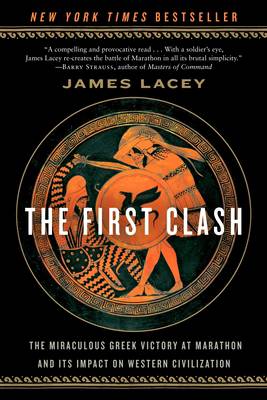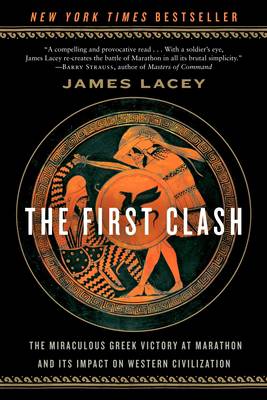
Bedankt voor het vertrouwen het afgelopen jaar! Om jou te bedanken bieden we GRATIS verzending (in België) aan op alles gedurende de hele maand januari.
- Afhalen na 1 uur in een winkel met voorraad
- Gratis thuislevering in België
- Ruim aanbod met 7 miljoen producten
Bedankt voor het vertrouwen het afgelopen jaar! Om jou te bedanken bieden we GRATIS verzending (in België) aan op alles gedurende de hele maand januari.
- Afhalen na 1 uur in een winkel met voorraad
- Gratis thuislevering in België
- Ruim aanbod met 7 miljoen producten
Zoeken
The First Clash
The Miraculous Greek Victory at Marathon and Its Impact on Western Civilization
James Lacey
Paperback | Engels
€ 15,45
+ 30 punten
Omschrijving
NEW YORK TIMES BESTSELLER "A compelling and provocative read . . . With a soldier's eye, Jim Lacey re-creates the battle of Marathon in all its brutal simplicity."--Barry Strauss, author of Masters of Command Marathon--one of history's most pivotal battles. Its name evokes images of almost superhuman courage, endurance, and fighting spirit. In this eye-opening book, military analyst James Lacey takes a fresh look at Marathon and reveals why the battle happened, how it was fought, and whether, in fact, it saved Western civilization. Lacey brilliantly reconstructs the world of the fifth century B.C. leading up to the astonishing military defeat of the Persian Empire by the vastly undermanned Greek defenders. With the kind of vivid detail that characterizes the best modern war reportage, he shows how the heavily armed Persian army was shocked and demoralized by the relentless assault of the Athenian phalanx. He reveals the fascinating aftermath of Marathon, how its fighters became the equivalent of our "Greatest Generation," and challenges the legacy and lessons that have often been misunderstood--perhaps, now more than ever, at our own peril. Immediate, visceral, and full of new analyses that defy decades of conventional wisdom, The First Clash is a superb interpretation of a conflict that indeed made the world safe for Aristotle, Plato, and our own modern democracy. "With a fresh eye to tactics, strategy, and military organization, and with his text grounded in direct experience of the troops on the battlefield, James Lacey gives us not only new understanding of how the Athenians managed to win but also a greater appreciation of the beginning of a long tradition of Western military dynamism that we take for granted today."--Victor Davis Hanson, author of Carnage and Culture
"Lacey's swords-and-shields approach will absorb readers ever fascinated by the famous battles of antiquity."--Booklist
"A lively and rewarding read."--Charleston Post and Courier
"Exemplary . . . Lacey, a veteran of the 82nd and 101st Airborne divisions and a professor at the Marine War College, brings to the tale of Marathon the practical experiences of the combat soldier and an intellectual sensibility."--The New Criterion
"Lacey's swords-and-shields approach will absorb readers ever fascinated by the famous battles of antiquity."--Booklist
"A lively and rewarding read."--Charleston Post and Courier
"Exemplary . . . Lacey, a veteran of the 82nd and 101st Airborne divisions and a professor at the Marine War College, brings to the tale of Marathon the practical experiences of the combat soldier and an intellectual sensibility."--The New Criterion
Specificaties
Betrokkenen
- Auteur(s):
- Uitgeverij:
Inhoud
- Aantal bladzijden:
- 272
- Taal:
- Engels
Eigenschappen
- Productcode (EAN):
- 9780553385755
- Verschijningsdatum:
- 9/04/2013
- Uitvoering:
- Paperback
- Formaat:
- Trade paperback (VS)
- Afmetingen:
- 141 mm x 208 mm
- Gewicht:
- 213 g

Alleen bij Standaard Boekhandel
+ 30 punten op je klantenkaart van Standaard Boekhandel
Beoordelingen
We publiceren alleen reviews die voldoen aan de voorwaarden voor reviews. Bekijk onze voorwaarden voor reviews.












